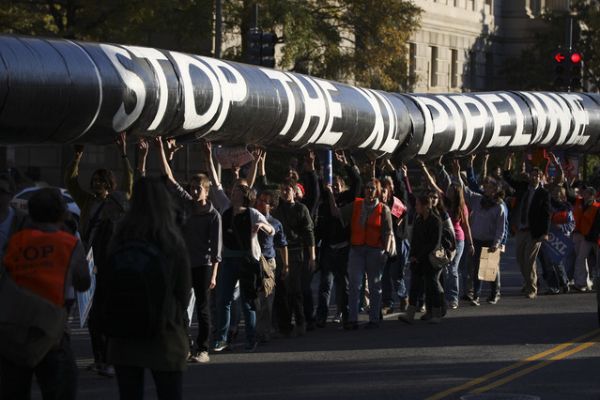Keystone XL Pipeline Resurges to Forefront of Energy Policy


The economy is the focus of media attention at the moment, with its post-election emphasis on the looming fiscal cliff. However, the Keystone XL pipeline has also made a resurgence lately, as the center of an environmental policy controversy. The administration's response to the dispute would be a test of Obama's relationship with the oil and gas industry.
On Wednesday, American Petroleum Institue (API) President Jack N. Gerard said, "If [President Obama] denies the application , it will show climate and emissions matter more than jobs and economic growth to his administration.”
The Keystone pipeline is hotly contested because its potential benefits to the economy and American energy independence is pitted against serious environment concerns. The pipeline starts in Alberta, Canada, passes through Nebraska, and ends in Texas. The project has the potential to create thousands of jobs, as well as to become a vital energy resource for the US. Nebraska will have a public hearing about the project on December 4,
Rising gas prices and turmoil in the Middle East, as well as news that America could be going through a serious energy boom, has brought energy to the forefront of national debate. A recent post-election poll by Zogby Analytics noted that, not only is energy causing rifts within the GOP, but that many voters are now supporting American energy independence through progressive renewable energies over projects like Keystone.
Asked to pick the highest priority to help solve America’s energy challenges, twice as many voters select renewable energy like wind and solar power (38 percent) than any other choice. Independents favor wind and solar over fossil fuels by a 4-to-1 margin – 48 percent pick renewable energy while just 12 percent select the Keystone XL tar sands pipeline and only 11 percent prioritize more oil and gas drilling on America’s public lands.
The Center for American Progress, a progressive think tank, also reports widespread public support for green energy and cites high politicization of environmental issues in part by big oil interest groups and "aggressive lobbying by the fossil fuels industry."
However, a poll released by the API reports 60 percent of Democrats and 94 percent of Republicans support Keystone XL construction, although it makes no mention of independents, a bloc that has grown significantly in recent years. The poll notes that, overall, 75 percent of pollees support the project.
Environmentalist groups, such as Green Peace and The Sierra Club, seemed to have been victorious earlier this year, when President Obama and the State Department rejected the pipeline's permit. The president approached his comments on the rejection cautiously, saying, "This announcement is not a judgement on the merits of the pipeline, but the arbitrary nature of a deadline that prevented the state department from gathering the information necessary to approve the project and protect the American people." During the second presidential debate, Obama reiterated he supports energy independence and implied his rejection of Keystone had more to do with administrative hurdles than anything else.
What I want to do is to create an economy that is strong and at the same time produce energy. And with respect to this pipeline that Governor Romney keeps on talking about, we’ve — we’ve built enough pipeline to wrap around the entire Earth once. So I’m all for pipelines; I’m all for oil production.
The Keystone pipeline project will need to be addressed by the administration quickly. Lobbying groups and environmentalists are pressuring the government for action on the measure and as, potentially, one of the president's first policy decisions of his new term, could determine the groundwork for environmental and energy policy of the next four years.



